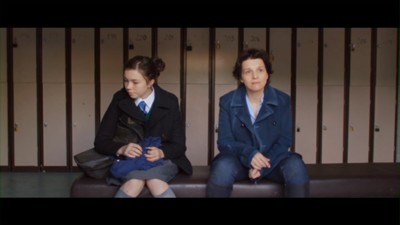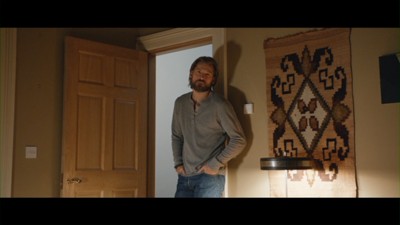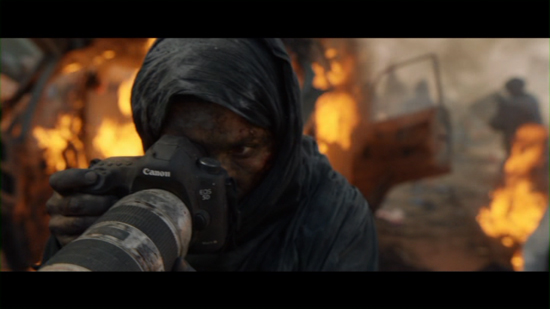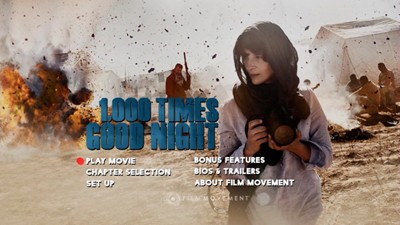| Reviews & Columns |
|
Reviews DVD TV on DVD Blu-ray 4K UHD International DVDs In Theaters Reviews by Studio Video Games Features Collector Series DVDs Easter Egg Database Interviews DVD Talk Radio Feature Articles Columns Anime Talk DVD Savant Horror DVDs The M.O.D. Squad Art House HD Talk Silent DVD
|
DVD Talk Forum |
|
|
| Resources |
|
DVD Price Search Customer Service #'s RCE Info Links |
|
Columns
|
|
|
1,000 Times Good Night
Film Movement // Unrated // December 23, 2014
List Price: $24.95 [Buy now and save at Amazon]
The Film:
Before he was writing and directing potent cinema, filmmaker Erik Poppe began his career as a cinematographer and press photojournalist. That experience has shaped his perspective on a secondary level by offering an intimate, almost voyeuristic eye at the stories he'd told, most memorably in his 2008 drama Troubled Water, a complex look at the psychology and guilt of a recently-released prisoner. For 1,000 Times Good Night, however, Poppe draws his attention towards material that's much more biographical in nature: the story of a war-zone photographer whose brush with death leads to her questioning whether she should continue her dangerous pursuits or rededicate herself to her husband and two daughters. While it sacrifices grounded drama for sensationalist scenarios and overwrought family quarrels, Poppe's appreciation for the profession itself channels into an valid depiction of her conflicted grasp on the call to journalistic duty ... until trite developments at the halfway point force everything out of frame.
It was just a matter of time before a situation became too much for Rebecca (Juliette Binoche), whose daring photographic work through war zones across the globe has earned her an esteemed professional reputation. This time, while embedded deep undercover in Afghanistan, she simply gets too close to the action: a bomb goes off near her location that does severe damage, sending her to the hospital. Following the incident, Rebecca returns home to Ireland to her husband (Nikolaj Coster-Waldau), a marine biologist, and her two daughters; her youngest obsesses over presents and pets, while the eldest (Lauryn Canny) begins to develop her own interests as she juggles concern with her mother and schoolwork. While home recuperating from the blasts, Rebecca has time to reflect on the sacrifices she's made to get to where she's at and whether she wants to continue working in war zones, a decision looming in her mind when she's offered a guaranteed safe photography gig in Kenya during her absence.
to her husband (Nikolaj Coster-Waldau), a marine biologist, and her two daughters; her youngest obsesses over presents and pets, while the eldest (Lauryn Canny) begins to develop her own interests as she juggles concern with her mother and schoolwork. While home recuperating from the blasts, Rebecca has time to reflect on the sacrifices she's made to get to where she's at and whether she wants to continue working in war zones, a decision looming in her mind when she's offered a guaranteed safe photography gig in Kenya during her absence.
Despite the opening scene containing more unlikely photojournalist fantasy than authentic introduction to Rebecca's motivation, 1,000 Times Good Night harnesses the potency of her profession as a dramatic focus instead of a mere plot device. Enhanced by stunning images she's taken over the years, many of which are convincing photos despite being shot for the film, director Poppe guides the audience into Rebecca's mind -- and her perspective at the locations -- for a look at the conflict between the necessities of dangerous work and the necessities of being a mother. With that in mind, the journey into Rebecca's perspective also paves the way for elevated dramatics once she learns exactly how her profession has drained the goodness from her family relationships, leading to awkward expressions of Rebecca trying too hard to participate and regain a grasp on safety.
These rich personal scenes might have gone over better with a different lead, because Juliette Binoche's otherwise robust talent comes across as too rigid and detached for the demands that 1,000 Times Good Night places upon her character, forcing the film's concept to succeed around her instead of through her. The passion for photography and family surrounds Rebecca's character through her sacrifices and her need for people to see the areas she's shooting, but Binoche's regular chilly attitude kept me at arm's length from her internal turmoil, forcing me to follow her family's responses to her instead of her own. A bearded and heavy-eyed Nikolaj Coster-Waldau proficiently wears the strain of a husband who constantly anticipates a call about his wife's death or injury, though, which assists those sequences where it's tough to decipher Rebecca's internal thoughts and moods. Perhaps that's intentional at times, rendering an almost soldierly disposition for this mother of two, but it depletes the story's potential when she's forced to choose between a return to active duty or to remain with her family.
at arm's length from her internal turmoil, forcing me to follow her family's responses to her instead of her own. A bearded and heavy-eyed Nikolaj Coster-Waldau proficiently wears the strain of a husband who constantly anticipates a call about his wife's death or injury, though, which assists those sequences where it's tough to decipher Rebecca's internal thoughts and moods. Perhaps that's intentional at times, rendering an almost soldierly disposition for this mother of two, but it depletes the story's potential when she's forced to choose between a return to active duty or to remain with her family.
Despite the questionable nature of Binoche's performance, 1,000 Times Good Night perseveres on its subtler ambitions of depicting Rebecca's reintegration into her family's life as a permanent fixture, how she's able to curry their favor while dealing with the possible surrender of such a large part of herself. That makes it all the more frustrating to see how director Poppe leads Rebecca's story down such a predictable path once she's offered a guaranteed "safe" photography opportunity in Kenya, in tandem with her elder daughter's research project into Africa. What results is a far more literal and ham-fisted choice between one's call to professional duty and one's dedication to their responsibilities, and the resulting messy domestic drama hinges on Poppe's willingness to push his character into a flawed, complex mental space. Rebecca's waning grasp on safety and the necessity to lend exposure to other people's conflicts should bring things more into focus, but instead it develops into an overblown, skewed snapshot of its promising subjects.
The DVD:
Video and Audio:
Erik Poppe's experience as a cinematographer consistently shines in the visual language of his films: colorful, organic in movement, richly detailed and playful with depth of field. Film Movement have routinely delivered very strong visual transfers of independent productions, and 1,000 Times Good Night is no exception. The 2.35:1-framed, 16x9-enhanced transfer sports exquisite flesh tones that react to varying natural temperatures of light, while lush greens and the laps of flames are striking yet stable. Fine detail emerges in close-ups on Binoche's and Coster-Waldau's aged features, as well as in sweaters and multiple wood grains in the modern homes, though there are a few points where dense textures create some shimmering. Contrast shifts between healthy black levels and pleasingly even balance in lighter sequences, and there are a cluster of dusk sequences with mesmerizing bokeh lights amid respectful darkness. All points considered, it's a robust and satisfying transfer.
Audio comes in both 2-channel and 5.1 Dolby Digital options, with the second essentially operating as a full-channel stereo track. Sound effects have very little separation and distinction from the front and back, creating a heavy and dull surround environment. With that in mind, the sound of snapped photos, wood chimes, and distanced artillery rounds are moderately clear and satisfying, while the musical accompaniment spreads to the channels with enough grace to be satisfying. More importantly, dialogue remains lucid and discernible, despite a few mild moments of low-volume balance.
Special Features:
A series of fairly insightful and earnest Interviews with Erik Poppe and Juliet Binoche (4:41, 16x9) together, with Erik Poppe (14:17, 16x9) himself, with Nikolaj Coster-Waldau (5:07, 16x9) (in Norwegian!), and with actress Lauryn Canny (7:10, 16x9) fill out the bulk of the extras. Film Movement have also included a raw stretch of Behind the Scenes (8:10, 16x9) material that offers a glimpse into Erik Poppe's method, his vibrancy on the set and his communication with his actors, along with actor and filmmaker Bios and a Trailer (1:33, 16x9).
Final Thoughts:
There's a potent story being told within 1,000 Times Good Night, about the call to action in capturing war-zone atrocities on film and where it leaves a photojournalist mother of two in the wake of a somewhat foreseeable disaster. Director Erik Poppe's experience in the field emerges through the way the film appreciates the gravity of the photos taken, as well as the mentality of someone who throws themselves in harm's way so others can experience the harmful zones. His appreciation for the field, however, might have come through a little too much, painting Rebecca's convenient circumstances in broad strokes and dialing up the family drama in response. Juliette Binoche's performance is stable and stern, but it neglects to properly jibe with the decisions Rebecca makes. Frustrating plot developments weaken the otherwise intimate and purposeful drama, in a clumsy effort to add complexity to an already flawed and unique character. Rent It.
Thomas Spurlin, Staff Reviewer -- DVDTalk Reviews | Personal Blog/Site
 |
Before he was writing and directing potent cinema, filmmaker Erik Poppe began his career as a cinematographer and press photojournalist. That experience has shaped his perspective on a secondary level by offering an intimate, almost voyeuristic eye at the stories he'd told, most memorably in his 2008 drama Troubled Water, a complex look at the psychology and guilt of a recently-released prisoner. For 1,000 Times Good Night, however, Poppe draws his attention towards material that's much more biographical in nature: the story of a war-zone photographer whose brush with death leads to her questioning whether she should continue her dangerous pursuits or rededicate herself to her husband and two daughters. While it sacrifices grounded drama for sensationalist scenarios and overwrought family quarrels, Poppe's appreciation for the profession itself channels into an valid depiction of her conflicted grasp on the call to journalistic duty ... until trite developments at the halfway point force everything out of frame.
It was just a matter of time before a situation became too much for Rebecca (Juliette Binoche), whose daring photographic work through war zones across the globe has earned her an esteemed professional reputation. This time, while embedded deep undercover in Afghanistan, she simply gets too close to the action: a bomb goes off near her location that does severe damage, sending her to the hospital. Following the incident, Rebecca returns home to Ireland
 to her husband (Nikolaj Coster-Waldau), a marine biologist, and her two daughters; her youngest obsesses over presents and pets, while the eldest (Lauryn Canny) begins to develop her own interests as she juggles concern with her mother and schoolwork. While home recuperating from the blasts, Rebecca has time to reflect on the sacrifices she's made to get to where she's at and whether she wants to continue working in war zones, a decision looming in her mind when she's offered a guaranteed safe photography gig in Kenya during her absence.
to her husband (Nikolaj Coster-Waldau), a marine biologist, and her two daughters; her youngest obsesses over presents and pets, while the eldest (Lauryn Canny) begins to develop her own interests as she juggles concern with her mother and schoolwork. While home recuperating from the blasts, Rebecca has time to reflect on the sacrifices she's made to get to where she's at and whether she wants to continue working in war zones, a decision looming in her mind when she's offered a guaranteed safe photography gig in Kenya during her absence. Despite the opening scene containing more unlikely photojournalist fantasy than authentic introduction to Rebecca's motivation, 1,000 Times Good Night harnesses the potency of her profession as a dramatic focus instead of a mere plot device. Enhanced by stunning images she's taken over the years, many of which are convincing photos despite being shot for the film, director Poppe guides the audience into Rebecca's mind -- and her perspective at the locations -- for a look at the conflict between the necessities of dangerous work and the necessities of being a mother. With that in mind, the journey into Rebecca's perspective also paves the way for elevated dramatics once she learns exactly how her profession has drained the goodness from her family relationships, leading to awkward expressions of Rebecca trying too hard to participate and regain a grasp on safety.
These rich personal scenes might have gone over better with a different lead, because Juliette Binoche's otherwise robust talent comes across as too rigid and detached for the demands that 1,000 Times Good Night places upon her character, forcing the film's concept to succeed around her instead of through her. The passion for photography and family surrounds Rebecca's character through her sacrifices and her need for people to see the areas she's shooting, but Binoche's regular chilly attitude kept me
 at arm's length from her internal turmoil, forcing me to follow her family's responses to her instead of her own. A bearded and heavy-eyed Nikolaj Coster-Waldau proficiently wears the strain of a husband who constantly anticipates a call about his wife's death or injury, though, which assists those sequences where it's tough to decipher Rebecca's internal thoughts and moods. Perhaps that's intentional at times, rendering an almost soldierly disposition for this mother of two, but it depletes the story's potential when she's forced to choose between a return to active duty or to remain with her family.
at arm's length from her internal turmoil, forcing me to follow her family's responses to her instead of her own. A bearded and heavy-eyed Nikolaj Coster-Waldau proficiently wears the strain of a husband who constantly anticipates a call about his wife's death or injury, though, which assists those sequences where it's tough to decipher Rebecca's internal thoughts and moods. Perhaps that's intentional at times, rendering an almost soldierly disposition for this mother of two, but it depletes the story's potential when she's forced to choose between a return to active duty or to remain with her family. Despite the questionable nature of Binoche's performance, 1,000 Times Good Night perseveres on its subtler ambitions of depicting Rebecca's reintegration into her family's life as a permanent fixture, how she's able to curry their favor while dealing with the possible surrender of such a large part of herself. That makes it all the more frustrating to see how director Poppe leads Rebecca's story down such a predictable path once she's offered a guaranteed "safe" photography opportunity in Kenya, in tandem with her elder daughter's research project into Africa. What results is a far more literal and ham-fisted choice between one's call to professional duty and one's dedication to their responsibilities, and the resulting messy domestic drama hinges on Poppe's willingness to push his character into a flawed, complex mental space. Rebecca's waning grasp on safety and the necessity to lend exposure to other people's conflicts should bring things more into focus, but instead it develops into an overblown, skewed snapshot of its promising subjects.
The DVD:
 |  |
Video and Audio:
Erik Poppe's experience as a cinematographer consistently shines in the visual language of his films: colorful, organic in movement, richly detailed and playful with depth of field. Film Movement have routinely delivered very strong visual transfers of independent productions, and 1,000 Times Good Night is no exception. The 2.35:1-framed, 16x9-enhanced transfer sports exquisite flesh tones that react to varying natural temperatures of light, while lush greens and the laps of flames are striking yet stable. Fine detail emerges in close-ups on Binoche's and Coster-Waldau's aged features, as well as in sweaters and multiple wood grains in the modern homes, though there are a few points where dense textures create some shimmering. Contrast shifts between healthy black levels and pleasingly even balance in lighter sequences, and there are a cluster of dusk sequences with mesmerizing bokeh lights amid respectful darkness. All points considered, it's a robust and satisfying transfer.
Audio comes in both 2-channel and 5.1 Dolby Digital options, with the second essentially operating as a full-channel stereo track. Sound effects have very little separation and distinction from the front and back, creating a heavy and dull surround environment. With that in mind, the sound of snapped photos, wood chimes, and distanced artillery rounds are moderately clear and satisfying, while the musical accompaniment spreads to the channels with enough grace to be satisfying. More importantly, dialogue remains lucid and discernible, despite a few mild moments of low-volume balance.
Special Features:
A series of fairly insightful and earnest Interviews with Erik Poppe and Juliet Binoche (4:41, 16x9) together, with Erik Poppe (14:17, 16x9) himself, with Nikolaj Coster-Waldau (5:07, 16x9) (in Norwegian!), and with actress Lauryn Canny (7:10, 16x9) fill out the bulk of the extras. Film Movement have also included a raw stretch of Behind the Scenes (8:10, 16x9) material that offers a glimpse into Erik Poppe's method, his vibrancy on the set and his communication with his actors, along with actor and filmmaker Bios and a Trailer (1:33, 16x9).
Final Thoughts:
There's a potent story being told within 1,000 Times Good Night, about the call to action in capturing war-zone atrocities on film and where it leaves a photojournalist mother of two in the wake of a somewhat foreseeable disaster. Director Erik Poppe's experience in the field emerges through the way the film appreciates the gravity of the photos taken, as well as the mentality of someone who throws themselves in harm's way so others can experience the harmful zones. His appreciation for the field, however, might have come through a little too much, painting Rebecca's convenient circumstances in broad strokes and dialing up the family drama in response. Juliette Binoche's performance is stable and stern, but it neglects to properly jibe with the decisions Rebecca makes. Frustrating plot developments weaken the otherwise intimate and purposeful drama, in a clumsy effort to add complexity to an already flawed and unique character. Rent It.
|
| Popular Reviews |
| Sponsored Links |
|
|
| Sponsored Links |
|
|
| Release List | Reviews | Shop | Newsletter | Forum | DVD Giveaways | Blu-Ray | Advertise |
|
Copyright 2024 DVDTalk.com All Rights Reserved. Legal Info, Privacy Policy, Terms of Use,
Manage Preferences,
Your Privacy Choices | |||||||














